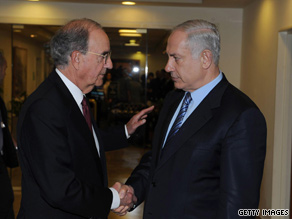
Don’t you just love a parade? Apparently the Obama administration does too, as evidenced by the steady stream of top U.S. officials visiting Israel this week. A bevy of heavy hitters are there, the likes of which haven’t been seen since the Persian Gulf War.
Just as Defense Secretary Robert Gates wrapped up his meetings there, Mideast peace envoy George Mitchell arrived for talks with Israeli Prime Minister Benjamin Netanyahu. Mitchell will be followed later this week by national security adviser James Jones and Dennis Ross, the White House’s point man on Iran. Aaron Miller, a former Mideast peace negotiator under President Clinton and author of “The Much Too Promised Land: America’s Elusive Search for Arab-Israeli Peace,” calls it “the big hug,” a show of reassurance to Israel that the U.S.-Israeli relationship remains strong despite the current squabble over settlements. To be sure, ties between the countries have been strained over President Obama’s insistence that Israel halt all settlements as part of his drive for a comprehensive Arab-Israeli peace, including a Palestinian state. And Israel is concerned Obama’s engagement policy vis-à-vis Iran will come at the expense of its security. Watch how the settlement issue remains a major stumbling block » But the flurry of diplomatic activity sends a strong signal that these disagreements are minor in comparison to how central the U.S.-Israel relationship is and how large Israel looms in every piece of the American policy puzzle in the Mideast. Which is why Gates offered Israel security reassurances with talks on Iran and missile defense. And why Mitchell emphasized the enduring strength of the friendship between the United States and Israel and has been working on a deal with the Israelis on settlements, which is expected to include a freeze on construction but would allow several hundred buildings already under construction to be exempted.
Don’t Miss
Defense chief arrives in Iraq
Obama seeks Iran response by September, Gates says
Visit to Syria starts week of U.S. diplomacy in Mideast
Jews protest Arab construction in Israel
One question remains about this diplomatic A-team though. Where is Secretary of State Hillary Clinton She hasn’t visited the Middle East since March when she held one day of talks with Israeli officials. She has not been to Israel since Netanyahu took office in late March. To be fair, Clinton just returned from a seven-day trip to Asia and spent the beginning of the week hosting top Chinese officials for two days of strategic talks. She leaves next week for a seven-nation tour of Africa. Appearing Sunday on NBC’s “Meet the Press,” Clinton missed an opportunity to frame the week’s visits to Israel within the context of the Obama administration’s plans for Mideast peacemaking. She spent a fair amount of time insisting she was Obama’s chief diplomat and and deflecting criticism that she was “sidelined” by the president’s team of foreign policy heavyweights and an elbow injury. “I broke my elbow, not my larynx,” she told host David Gregory. Yet the administration’s chief diplomat didn’t mention the Mideast peace process, one of Obama’s stated top foreign policy priorities, even once. Clinton already enjoys a healthy dose of Israeli respect from her days as a pro-Israel senator from New York. Now the secretary must also define herself, both in word and in deed, as a key player on the president’s Mideast peace team.
Obama has to work at his relationship with Israel, too. His aides can only do so much to ease Israeli fears about his intentions. Candidate Obama got high marks for a visit to Israel during the campaign. But if he wants to be seen as the kind of honest broker who can achieve true Mideast peace, he needs to make his own trip to Israel. His June speech in Cairo, Egypt, established his credentials with the Arab world. Now it’s Israel’s turn.